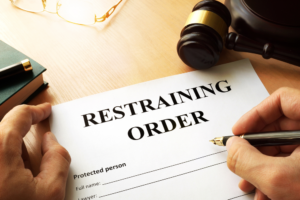Restraining Order Violations
Restraining orders are court-issued legal documents that are designed to protect individuals from harassment, stalking, or other forms of abuse.
However, when these orders are violated, the consequences can be severe. If you’ve been charged with violating a restraining order, here’s how the experienced domestic violence lawyer at The Rodriguez Law Group Los Angeles Criminal Defense Attorneys can help you navigate this challenging legal landscape.
What Is a Restraining Order?
A restraining order is a court-issued legal document that prohibits an individual from contacting, communicating with, or being in physical proximity to another person. These orders are typically issued in cases of domestic violence, harassment, stalking, or other forms of threatening behavior. The primary purpose of a restraining order is to protect the safety and well-being of the individual seeking the order.
Restraining orders can have a significant impact on the lives of those involved, both the protected party and the individual subject to the order. Understanding the legal implications and consequences of violating a restraining order is crucial for maintaining compliance and avoiding further legal complications.
What Are the Standard Legal Conditions of a Restraining Order?
 When a restraining order is issued, the court typically outlines specific conditions that the individual subject to the order must follow.
When a restraining order is issued, the court typically outlines specific conditions that the individual subject to the order must follow.
These conditions may include:
- Prohibition on contacting or communicating with the protected party, either directly or indirectly, through any means, including phone, email, text messages, social media, or third parties.
- Requirement to stay a certain distance away from the protected party’s home, workplace, or other frequented locations.
- Prohibition on possessing or purchasing firearms or other weapons.
- Requirement to vacate a shared residence or move out of the protected party’s home.
- Restrictions on child custody, visitation rights, or other familial arrangements.
It is crucial to understand and comply with the specific conditions outlined in the restraining order, as any violation can result in serious legal consequences.
Different Types of Restraining Orders
Restraining orders can take various forms, depending on the specific circumstances and the jurisdiction in which they are issued. Some common types of restraining orders include:
- Domestic Violence Restraining Orders: These orders are issued to protect individuals who have experienced domestic violence, including physical, emotional, or sexual abuse, from their current or former intimate partners.
- Stalking Restraining Orders: These orders are issued to protect individuals from stalking, harassment, or threats from another person.
- Civil Harassment Restraining Orders: These orders protect individuals from harassment, threats, or other forms of unwanted behavior that do not necessarily involve a domestic or intimate relationship.
- Emergency Protective Orders: Law enforcement can issue these temporary restraining orders in emergencies, typically for a short duration until they can obtain a more permanent order.
The specific type of restraining order, as well as the conditions and duration of the order, can vary depending on the jurisdiction and the circumstances of the case.
Consequences of Restraining Order Violations
Violating a restraining order can have serious legal consequences, both for the individual subject to the order and the protected party.
Some of the potential consequences of a restraining order violation include:
- Criminal Charges: Violating a restraining order can result in criminal charges, such as contempt of court, violation of a protective order, or even more severe charges like stalking, harassment, or assault, depending on the nature of the violation.
- Fines and Jail Time: Depending on the severity of the violation and the jurisdiction, individuals who are found guilty of violating a restraining order may face fines, jail time, or even a combination of both.
- Increased Restrictions: In some cases, a violation of a restraining order may lead to the court imposing additional or more stringent conditions on the individual subject to the order, further limiting their freedoms and movements.
- Negative Impact on Future Legal Matters: A violation of a restraining order can have a negative impact on future legal matters, such as child custody, divorce proceedings, or other civil or criminal cases, as it may be seen as evidence of a pattern of behavior or a disregard for the law.
You need a lawyer to explain the gravity of violating a restraining order and the potential consequences to avoid further legal complications and enforce your legal rights.
Legal Penalties for Violating a Restraining Order
The specific legal penalties for violating a restraining order can vary depending on the jurisdiction and the circumstances of the violation.
However, some common penalties include:
- Misdemeanor Charges: Violations of a restraining order are often charged as misdemeanors, which can result in fines ranging from a few hundred dollars to several thousand dollars, as well as up to one year in county jail.
- Felony Charges: In some cases, particularly when the violation involves violence, threats, or the use of a weapon, the violation may be charged as a felony, which can result in more severe penalties, such as several years in state prison.
- Probation: In some cases, individuals who are found guilty of violating a restraining order may be sentenced to probation, which can include conditions such as mandatory counseling, anger management classes, or electronic monitoring.
- Increased Restrictions: In addition to criminal penalties, a violation of a restraining order may also result in the court imposing additional or more stringent conditions on the individual subject to the order, such as a longer duration of the order or more limited contact with the protected party.
The specific penalties for violating a restraining order can vary significantly depending on the jurisdiction and the circumstances of the case. An experienced attorney can explain the potential legal consequences and develop an effective defense strategy.
Understanding the Impact of Restraining Order Violations on Future Legal Matters
Violating a restraining order can have a significant impact on future legal matters, both for the individual subject to the order and the protected party.
Some potential consequences include:
- Child Custody and Visitation: A violation of a restraining order may be used as evidence in child custody and visitation disputes, potentially resulting in the court limiting or denying the violator’s access to their children.
- Divorce and Separation: A violation of a restraining order can negatively impact the outcome of divorce or separation proceedings, particularly when it comes to the division of assets, spousal support, or other financial arrangements.
- Criminal Record: A conviction for violating a restraining order will result in a criminal record, which can have far-reaching consequences, such as difficulty finding employment, securing housing, or obtaining professional licenses.
- Reputation and Credibility: A violation of a restraining order can also damage an individual’s reputation and credibility, which can damage their personal and professional relationships, as well as their ability to participate in future legal proceedings.
You need a lawyer to explain the long-term consequences of violating a restraining order and to take steps to avoid such violations, as they can have a lasting impact on an individual’s life and future legal matters.
How The Rodriguez Law Group Los Angeles Criminal Defense Attorneys Can Help with Restraining Order Violations
 At The Rodriguez Law Group Los Angeles Criminal Defense Attorneys, we understand the complexities and challenges associated with restraining order violations. Our experienced team of attorneys is dedicated to providing comprehensive legal representation and support to individuals facing such allegations.
At The Rodriguez Law Group Los Angeles Criminal Defense Attorneys, we understand the complexities and challenges associated with restraining order violations. Our experienced team of attorneys is dedicated to providing comprehensive legal representation and support to individuals facing such allegations.
Here’s how we can help:
- Legal Defenses: We will thoroughly analyze the circumstances of your case and explore all available legal defenses, such as lack of intent, insufficient evidence, or violations of your constitutional rights.
- Exculpatory Evidence: Our team will work diligently to gather and present exculpatory evidence that may demonstrate your innocence or mitigate the severity of the alleged violation.
- Negotiation and Plea Bargaining: In some cases, we may be able to negotiate with the prosecution to reduce the charges or reach a favorable plea bargain, minimizing the potential legal consequences.
- Courtroom Representation: If your case proceeds to trial, our skilled litigators will provide robust courtroom representation, challenging the prosecution’s arguments and advocating for your rights.
- Ongoing Support: We understand that navigating the legal system can be overwhelming, which is why we provide our clients with ongoing support and guidance throughout the entire legal process.
If you or a loved one are facing allegations of a restraining order violation, don’t hesitate to contact The Rodriguez Law Group Los Angeles Criminal Defense Attorneys for a free consultation.
Legal Defenses Against Restraining Order Violations
When facing allegations of a restraining order violation, your lawyer can explore all available legal defenses.
At The Rodriguez Law Group Los Angeles Criminal Defense Attorneys, our experienced attorneys will work diligently to build a strong defense strategy tailored to the specific circumstances of your case.
Some potential legal defenses we may consider include:
- Lack of Intent: We may be able to demonstrate that the alleged violation was unintentional or that you did not have the necessary knowledge or intent to violate the order.
- Insufficient Evidence: We will carefully examine the prosecution’s evidence and challenge any weaknesses or inconsistencies that may cast doubt on the allegations.
- Violation of Constitutional Rights: In some cases, we may be able to argue that your constitutional rights, such as due process or the right to privacy, were violated during the investigation or prosecution of the alleged violation.
- Necessity or Self-Defense: Depending on the circumstances, we may be able to argue that the alleged violation was necessary to protect yourself or others from harm.
- Lack of Personal Jurisdiction: In certain cases, we may be able to argue that the court that issued the restraining order did not have proper jurisdiction over you or the protected party.
By exploring these and other legal defenses, we aim to build a comprehensive strategy to protect your rights and minimize the potential consequences of the alleged restraining order violation.
Steps to Take if Authorities Accuse You of Violating a Restraining Order
If authorities accuse you of violating a restraining order, take immediate action to protect your rights and defend yourself against the allegations.
Here are the steps you should take:
- Seek Legal Representation: Consult an experienced attorney at The Rodriguez Law Group Los Angeles Criminal Defense Attorneys. We can provide guidance and representation throughout the legal process.
- Understand the Allegations: Carefully review the restraining order and the specific allegations against you with our lawyers to ensure you have a clear understanding of the alleged violation.
- Gather Relevant Evidence: Collect any documentation, witness statements, or other evidence that may support your defense and demonstrate your compliance with the restraining order.
- Comply with the Restraining Order: Even while defending against the allegations, comply with the terms of the restraining order to avoid further legal complications.
- Avoid Contact with the Protected Party: Refrain from any direct or indirect contact with the protected party, as they may use this as evidence against you.
- Prepare for the Legal Process: Work closely with your attorney to prepare for any upcoming court appearances, negotiations, or legal proceedings related to the alleged violation.
By taking these steps and working with an experienced legal team, you can increase your chances of a favorable outcome and protect your rights throughout the legal process.
How We Can Provide Exculpatory Evidence to Prove Your Innocence
At The Rodriguez Law Group Los Angeles Criminal Defense Attorneys, we understand the importance of presenting exculpatory evidence to demonstrate your innocence in a restraining order violation case.
Our team of skilled attorneys will work diligently to gather and present any evidence that may support your defense, including:
- Witness Statements: We will interview and obtain written statements from any witnesses who can corroborate your version of events or provide information that contradicts the allegations.
- Digital Evidence: We will thoroughly investigate and collect any relevant digital evidence, such as phone records, text messages, emails, or social media posts, that may show you did not violate the restraining order.
- Alibi Evidence: If you can provide a credible alibi for your whereabouts at the time of the alleged violation, we will work to gather and present this evidence to the court.
- Expert Testimony: In some cases, we may call upon expert witnesses, such as forensic analysts or private investigators, to provide technical evidence that supports your defense.
- Documentary Evidence: We will gather any relevant documents, such as receipts, travel records, or other documentation, that can corroborate your compliance with the restraining order.
By thoroughly investigating the facts of your case and presenting a compelling body of exculpatory evidence, we create reasonable doubt in the prosecution’s case and increase your chances of a favorable outcome.
Our Strategy for Challenging the Prosecution’s Alleged Inculpatory Evidence
In addition to presenting exculpatory evidence, The Rodriguez Law Group Los Angeles Criminal Defense Attorneys will also employ a comprehensive strategy to challenge any inculpatory evidence presented by the prosecution.
Our approach may include:
- Challenging the Chain of Custody: We will closely examine the handling and preservation of any physical evidence to identify any potential gaps or irregularities that may call its reliability into question.
- Questioning the Credibility of Witnesses: We will thoroughly investigate the background and motivations of any witnesses presented by the prosecution and use cross-examination to expose any inconsistencies or biases in their testimony.
- Attacking the Reliability of Forensic Evidence: If the prosecution relies on forensic evidence, such as DNA analysis or fingerprint analysis, we will work with external experts to scrutinize the methods and conclusions used by the prosecution’s experts.
- Highlighting Procedural Irregularities: We will carefully review the investigation and prosecution process to identify any procedural errors or violations of your constitutional rights that may undermine the legitimacy of the prosecution’s case.
- Presenting Alternative Explanations: Where appropriate, we will present alternative explanations for the evidence presented by the prosecution, demonstrating that there are reasonable doubts about the validity of the allegations.
By employing this multifaceted approach, we aim to cast doubt on the prosecution’s case and increase the likelihood of a favorable outcome for you.
What to Expect from the Prosecution During the Courtroom Process
 When facing allegations of a restraining order violation, it is important to understand the tactics and strategies that the prosecution may employ during the courtroom process. The Rodriguez Law Group Los Angeles Criminal Defense Attorneys is well-versed in these tactics and will work diligently to protect your rights and interests throughout the proceedings.
When facing allegations of a restraining order violation, it is important to understand the tactics and strategies that the prosecution may employ during the courtroom process. The Rodriguez Law Group Los Angeles Criminal Defense Attorneys is well-versed in these tactics and will work diligently to protect your rights and interests throughout the proceedings.
Some of the key things you can expect from the prosecution include:
- Aggressive Questioning and Cross-Examination: The prosecution will likely engage in aggressive questioning and cross-examination of you and any witnesses presented by the defense, with the goal of undermining your credibility and the strength of your defense.
- Reliance on Emotional Appeals: The prosecution may attempt to appeal to the emotions of the judge or jury by emphasizing the potential harm or fear experienced by the protected party as a result of the alleged violation.
- Presentation of Compelling Evidence: The prosecution will strive to present a comprehensive and compelling case, including physical evidence, witness testimony, and expert analysis, to support the allegations against you.
- Pursuit of Maximum Penalties: The prosecution will likely seek the maximum possible penalties, such as fines, jail time, or additional restrictions, if you are found guilty of the alleged violation.
- Resistance to Plea Bargaining: In some cases, the prosecution may be unwilling to engage in plea bargaining or may offer terms that are not favorable to you, forcing the case to go to trial.
By anticipating these tactics and working closely with our experienced attorneys, you can be better prepared to navigate the courtroom process and protect your rights throughout the legal proceedings.
Contact Us Today for a Free Consultation
Restraining order violations can have serious legal consequences, including fines, jail time, and a permanent criminal record. If you have been accused of violating a restraining order, it is crucial to seek legal representation from an experienced criminal defense attorney who can protect your rights and help you navigate the complex legal system.
At The Rodriguez Law Group Los Angeles Criminal Defense Attorneys, our team of skilled attorneys is dedicated to providing comprehensive legal support to clients facing restraining order violations. Contact us today for your free consultation and learn how we can help you achieve the best possible outcome in your case.


